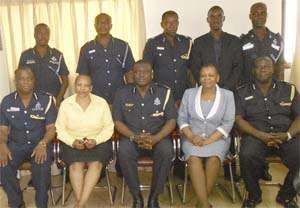
THE OMBUDSMAN of Lesotho, Matsoana Fanana, has called on the Ghana Police Service to have an insight into the operations of one of its core units, the Police Intelligence Professional Standards Bureau (PIPS).
She was accompanied by the principal investigator at her outfit, Motselisi Makhele. The visit was part of a familiarization tour of the country.
The delegation also visited the Ministry of Lands and Natural Resources, and also observed proceedings at Parliament, CHRAJ head office and the Amasaman Municipal CHRAJ Office.
The Director General of Research and Planning, DCOP David Asante-Appeatu, who sat in the stead of the Inspector General of Police (IGP), said the public had given the police the authority to perform a task on its behalf, adding that police were therefore accountable to the people in the performance of their duties.
In this vein, PIPS was established in 1978, but was then called Special Police Command, to serve as a check, among other things, on the professional standards of personnel, until 2005 when the name evolved to PIPS.
The director general was highly elated for the visit and hoped that the two-man-delegation would by the end of their visit, gather enough knowledge to their satisfaction.
The Director General of PIPS, DCOP Timothy Ashiley, took the visitors through the core business of his unit and outlined some of it successes and aspirations.
He noted, among many things, that the relocation of the PIPS office was being considered as the Police Headquarters was intimidating for the civilians who mostly visited the unit with complaints about personnel of the service.
The IGP, he noted, had already approved the recommendation to relocate the office, adding that very soon, an office space outside the headquarters would be allocated to PIPS for its operations. He also mentioned that some civilians would be brought on board to assist, explaining that this would make it more comfortable and easier for complainants to lodge their complaints.
PIPS was formed in the wake of a universal desire and subsequent enactment of legislations, to promote, ensure and enhance the dignity of mankind to appreciable standards.
It is also to forestall abuses of humanity, with its attendant enforcement and maintenance of international human rights, as well enforce and monitor professional standards of all police personnel, being the catalysts to give effect to demands of the legislature and practice of democratic policing.
The bureau has 35 police personnel with a mandate to collate and coordinate the gathering of information and intelligence on crimes and criminals. It is to prepare statistics on prevailing crime trends throughout the country.
Among other things, it is also to investigate public complaints, instances of malfeasance and other acts of omission or commission, and more so monitor compliance with international police professional standards.
PIPS conducts regular inspections of police stations countrywide, equipment, records, documents and other facilities, in accordance with the guidelines provided in the relevance service instructions.
So far, PIPS has received a record of 5705 cases, out of which investigations have been completed on 3500.
Five thousand cases were true, with 705 being false while 2205 are pending.
By Rocklyn Antonio & Dominic Kojo Blay




 Lay KPMG audit report on SML-GRA contract before Parliament – Isaac Adongo tells...
Lay KPMG audit report on SML-GRA contract before Parliament – Isaac Adongo tells...
 Supervisor remanded for stabbing businessman with broken bottle and screwdriver
Supervisor remanded for stabbing businessman with broken bottle and screwdriver
 NDC watching EC and NPP closely on Returning Officer recruitment — Omane Boamah
NDC watching EC and NPP closely on Returning Officer recruitment — Omane Boamah
 Your decision to contest for president again is pathetic – Annoh-Dompreh blasts ...
Your decision to contest for president again is pathetic – Annoh-Dompreh blasts ...
 Election 2024: Security agencies ready to keep peace and secure the country — IG...
Election 2024: Security agencies ready to keep peace and secure the country — IG...
 People no longer place value in public basic schools; new uniforms, painting wil...
People no longer place value in public basic schools; new uniforms, painting wil...
 'Comedian' Paul Adom Otchere needs help – Sulemana Braimah
'Comedian' Paul Adom Otchere needs help – Sulemana Braimah
 Ejisu by-election: Only 33% of voters can be swayed by inducement — Global InfoA...
Ejisu by-election: Only 33% of voters can be swayed by inducement — Global InfoA...
 Minority will expose the beneficial owners of SML, recover funds paid to company...
Minority will expose the beneficial owners of SML, recover funds paid to company...
 Prof. Opoku-Agyemang has ‘decapitated’ the NPP’s strategies; don’t take them ser...
Prof. Opoku-Agyemang has ‘decapitated’ the NPP’s strategies; don’t take them ser...
